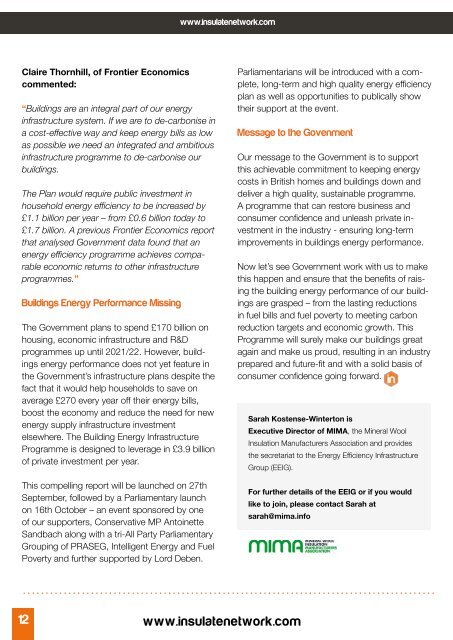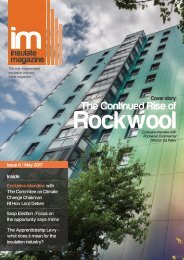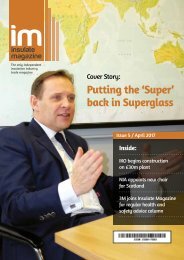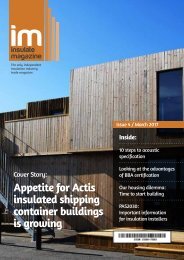Insulate Magazine Issue 11
You also want an ePaper? Increase the reach of your titles
YUMPU automatically turns print PDFs into web optimized ePapers that Google loves.
www.insulatenetwork.com<br />
Claire Thornhill, of Frontier Economics<br />
commented:<br />
“Buildings are an integral part of our energy<br />
infrastructure system. If we are to de-carbonise in<br />
a cost-effective way and keep energy bills as low<br />
as possible we need an integrated and ambitious<br />
infrastructure programme to de-carbonise our<br />
buildings.<br />
The Plan would require public investment in<br />
household energy efficiency to be increased by<br />
£1.1 billion per year – from £0.6 billion today to<br />
£1.7 billion. A previous Frontier Economics report<br />
that analysed Government data found that an<br />
energy efficiency programme achieves comparable<br />
economic returns to other infrastructure<br />
programmes.”<br />
Buildings Energy Performance Missing<br />
The Government plans to spend £170 billion on<br />
housing, economic infrastructure and R&D<br />
programmes up until 2021/22. However, buildings<br />
energy performance does not yet feature in<br />
the Government’s infrastructure plans despite the<br />
fact that it would help households to save on<br />
average £270 every year off their energy bills,<br />
boost the economy and reduce the need for new<br />
energy supply infrastructure investment<br />
elsewhere. The Building Energy Infrastructure<br />
Programme is designed to leverage in £3.9 billion<br />
of private investment per year.<br />
This compelling report will be launched on 27th<br />
September, followed by a Parliamentary launch<br />
on 16th October – an event sponsored by one<br />
of our supporters, Conservative MP Antoinette<br />
Sandbach along with a tri-All Party Parliamentary<br />
Grouping of PRASEG, Intelligent Energy and Fuel<br />
Poverty and further supported by Lord Deben.<br />
Parliamentarians will be introduced with a complete,<br />
long-term and high quality energy efficiency<br />
plan as well as opportunities to publically show<br />
their support at the event.<br />
Message to the Govenment<br />
Our message to the Government is to support<br />
this achievable commitment to keeping energy<br />
costs in British homes and buildings down and<br />
deliver a high quality, sustainable programme.<br />
A programme that can restore business and<br />
consumer confidence and unleash private investment<br />
in the industry - ensuring long-term<br />
improvements in buildings energy performance.<br />
Now let’s see Government work with us to make<br />
this happen and ensure that the benefits of raising<br />
the building energy performance of our buildings<br />
are grasped – from the lasting reductions<br />
in fuel bills and fuel poverty to meeting carbon<br />
reduction targets and economic growth. This<br />
Programme will surely make our buildings great<br />
again and make us proud, resulting in an industry<br />
prepared and future-fit and with a solid basis of<br />
consumer confidence going forward.<br />
Sarah Kostense-Winterton is<br />
Executive Director of MIMA, the Mineral Wool<br />
Insulation Manufacturers Association and provides<br />
the secretariat to the Energy Efficiency Infrastructure<br />
Group (EEIG).<br />
For further details of the EEIG or if you would<br />
like to join, please contact Sarah at<br />
sarah@mima.info<br />
12 www.insulatenetwork.com
















